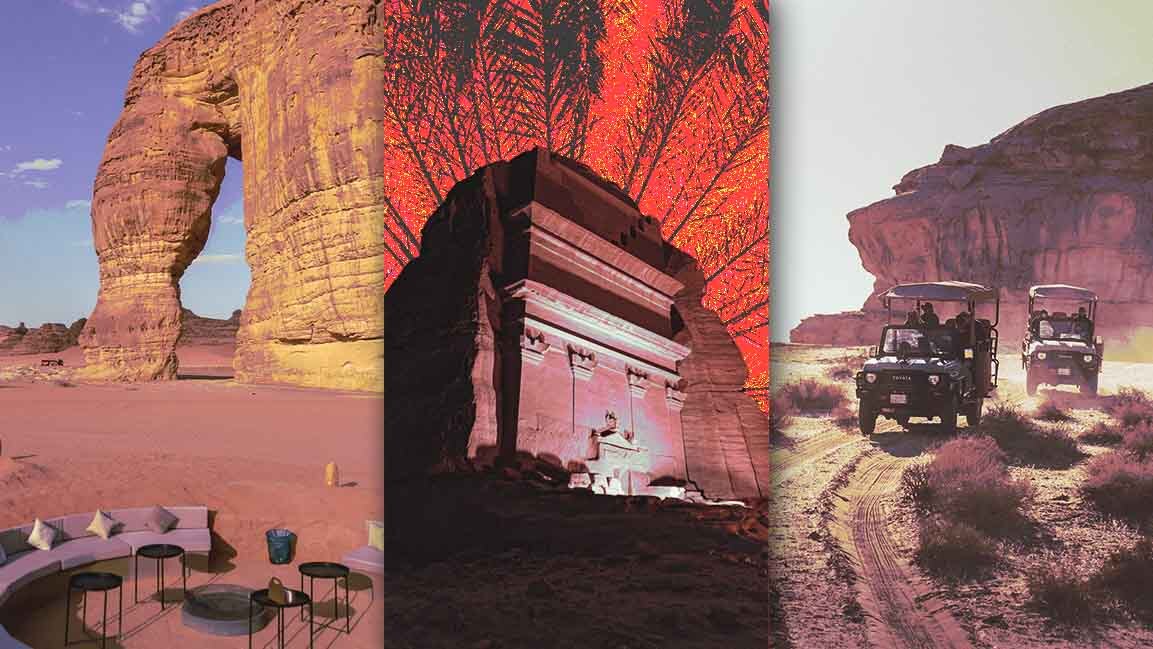- | 9:00 am
AlUla aims to be a model for sustainable tourism and economic growth
AlUla is reimagining tourism with cultural preservation and sustainable growth to benefit visitors and communities

The key to innovative tourism is blending cultural preservation with sustainable modern infrastructure. This fosters a trifecta of benefits: deeper community engagement, environmental responsibility, and a boost to the local economy.
AlUla exemplifies this multifaceted approach. The goal isn’t just attracting visitors but creating enriching experiences that educate, empower, and benefit residents, workers, and tourists alike. Rami Almoallim, VP of Destination Marketing & Management at The Royal Commission for AlUla, says it’s a model for “responsible and immersive” travel.
ALULA REIMAGINES TOURISM
Redefining the traditional tourist experience, AlUla is where cultural preservation thrives alongside economic development. According to Almoallim, the vision is clear: establishing the city as a premier destination offering authentic and meaningful experiences.
This vision is exemplified by AlUla’s ambitious cultural and tourism projects, including the Museum of the Incense Road and the Contemporary Art Museum. These are part of a comprehensive plan to develop 15 cultural landmarks across various districts. The restoration of Dar Tantora The House Hotel in AlUla Old Town marks a significant milestone in heritage preservation, breathing new life into ancient mud-brick structures dating back to the 12th century.
Almoallim says, “It stands as a personification of our commitment to cultural preservation through employing local artisans for restoration efforts, interiors inspired by traditional décor and furniture, and storytelling elements that bring the rich intangible heritage of the area to life.”
In parallel with these cultural initiatives, four new luxury hotels are poised to offer a culturally sensitive and environmentally responsible experience.
The Chedi Hegra, nestled within Saudi Arabia’s first UNESCO World Heritage Site, prioritizes seamless integration with existing structures. Meanwhile, the Azulik AlUla Resort, situated in the Nabataean Horizon District, embodies eco-luxury principles, drawing inspiration from the architectural heritage of the ancient Nabataeans. The Sharaan Resorts project, another ambitious undertaking, fuses luxury hospitality with cultural reverence and environmental stewardship.
Meanwhile, AlUla International Airport is undergoing a substantial expansion project to accommodate the anticipated visitor surge, with five annual festivals celebrating art, culture, and diverse themes throughout the year.
FILM ALULA
In line with its cultural ambitions, AlUla has emerged as a flourishing production hub. Film AlUla has achieved remarkable success, attracting talented directors from local, regional, and international backgrounds, highlights Almoallim.
In 2023, AlUla hosted 123 projects across various mediums, including feature films, TV series, commercials, documentaries, and music videos. Notable productions like the third season of Paper Empire and David Guetta’s music video The Monolith have contributed to this flourishing landscape. Momentum continues with ongoing projects like music artist Anderson Paak’s directorial debut, K-POPS!, which is currently in production.
Film AlUla attracts filmmakers with generous incentives, including up to 40% rebates. Its studio complex comprises two 26,000 sq ft soundstages, production facilities such as hair and makeup rooms, workshops, RV parking, and a 61,500 sq ft backlot. The nearby Film AlUla Residence, just a 15-minute drive away, offers 300 fully furnished accommodation units and convenient film-friendly office space.
Film AlUla’s filmmaking surge is driven by a significant partnership with Stampede Ventures, which will introduce ten productions and a $350 million investment over three years. This collaboration solidifies AlUla’s position as an emerging global film hub, promoting creativity, innovation, and economic growth in the area.
PRESERVING THE HERITAGE
“AlUla is dedicated to preserving its cultural heritage while fostering sustainable growth,” says Almoallim.
The Journey Through Time master plan prioritizes eco-friendly tourism experiences that honor the environment and uphold cultural traditions. This approach balances preservation and progress, benefiting visitors and the local community.
On the other hand, The Path to Prosperity master plan focuses on sustainable regeneration and urban expansion in central and southern AlUla, aiming for balanced development that integrates nature, history, and modern living.
Key to this vision is the implementation of eco-friendly infrastructure like the AlUla Experiential Tramway, which promotes sustainable mobility and reduces road traffic emissions.
AlUla prioritizes comprehensive sustainability efforts, including water and waste management and energy-efficient buildings, to minimize environmental impact. Its tourism strategy focuses on luxury boutique heritage experiences, and managing visitor flow to preserve environmental and cultural sites.
Community engagement is central, with initiatives like AlUla Vibes and the Hammayah Training program promoting local involvement in tourism for economic growth. Education initiatives, including scholarship programs and the upcoming AlUla Academy, provide vocational training in tourism and hospitality. Projects like Madrasat Addeera foster cultural ties and create economic opportunities in heritage and tourism.
DIVERSIFYING THE ECONOMY
Almoallim says AlUla’s transformation into a tourism hub aligns with Saudi Vision 2030’s aim to boost tourism’s contribution to GDP.
The Journey Through Time master plan outlines a 15-year strategy to responsibly develop AlUla’s historical core. It aims to create 38,000 jobs, add $32 billion to the GDP, and increase the population to 130,000 by 2035.
Aligned with Saudi Arabia’s sustainability targets and the Saudi Green Initiative, AlUla is committed to establishing a global standard for sustainable tourism. Infrastructure, notably hotels, prioritizes sustainability, focusing on water and energy efficiency, recycling, and environmental conservation. Development projects strictly adhere to environmental standards, necessitating Mostadam Gold or LEED Gold certifications.
Almoallim adds that recent initiatives demonstrate its dedication to sustainability, such as using recycled materials, energy-efficient lighting, and advanced waste management systems.








































